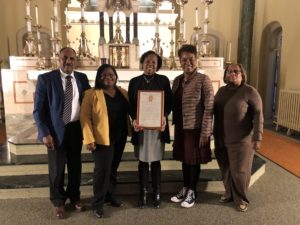COLLEEN JURKIEWICZ
CATHOLIC HERALD STAFF
For almost 30 years, November has been recognized as Black Catholic History Month — but the  designation got a little more “official” in 2019 thanks to a joint resolution passed by the Wisconsin State Assembly on Nov. 12.
designation got a little more “official” in 2019 thanks to a joint resolution passed by the Wisconsin State Assembly on Nov. 12.
Assembly Joint Resolution 105, which proclaims November 2019 as Black Catholic History Month, was introduced by Rep. LaKeshia Myers, who represents District 12 in Milwaukee. The resolution was read aloud at the conclusion of 8:30 a.m. Mass Dec. 1 at St. Francis of Assisi Church in Milwaukee.
At the Mass, Rep. Myers and State Sen. Lena Taylor, who co-sponsored the resolution, presented the proclamation to members of the Archdiocese of Milwaukee’s Black Catholic Ministry Commission.
“I am not a Catholic — I’m an old Baptist girl, and Lena is an old Pentecostal girl,” said Rep. Myers. But as a “believer in the word of the Lord,” she called the Catholic Church “the mother Church” of Christian religions. “I’m happy to be in my Mother Church today.”
Several of her family members are Catholic, she told the congregation, and she would often hear from them that November is Black Catholic History Month. “I said, ‘Oh, we have a month? Another month? Oh, I’m all for that,’” she said.
Hearing the proclamation read aloud “was so surreal,” said Mary Words, a member of the Black Catholic Ministry Commission. “What’s most important is the fact that Black Catholics and their rich spirituality and all that they give to the Church is being recognized on a bigger level. There are people who don’t know what Black Catholics bring to this Church. But we’re here and we’re not going anywhere. It’s so important that we’re being acknowledged. This brings an awareness to who we are and who we’ve been.”
Because this is a joint resolution, to be fully enacted it requires concurrence by the Wisconsin Senate, which is adjourned for the remainder of 2019. The issue will likely be taken up when the Senate resumes business next year; the earliest a floor period vote could occur would be Jan. 14. As a bipartisan resolution, concurrence in the Senate is likely.
St. Francis of Assisi was chosen as the location for the presentation because of the parish’s extensive history of activism in the African-American community, and because of support lent by its pastor, Fr. Michael Bertram, to the resolution. Fr. Bertram penned a letter to lawmakers in Madison in support of Rep. Myers’ proposal.
“The contributions of Black Catholics cannot be underestimated,” wrote Fr. Bertram in the letter, which was cosigned by about 125 parishioners. “Black Catholics are motivated by their faith to be some of the most active participants in the community, addressing societal needs and involving themselves to promote betterment in the lives of others, most notably the poor. Black Catholics demonstrate a sense of community that embraces people of other races and languages, perhaps because of their own struggle to be accepted in society. Despite obstacles, even from the very Catholic Church to which they belong, Black Catholics have a resilience in life that finds its strength and hope in their Catholic faith.”
The resolution notes that the National Black Catholic Clergy Caucus of the United States originally designated November as Black Catholic History Month in 1990, and points out that All Souls Day (celebrated on Nov. 2) is a particularly appropriate time to “remember the estimated two million enslaved Africans who lost their lives due to inhumane treatment during the Middle Passage crossing of the Atlantic Ocean.”
The resolution also extols the contributions of Black Catholics today, “who were not only able to establish their own leadership and cultural identity within the faith, but also to push religious communities to begin reckoning with its history of racism.”
